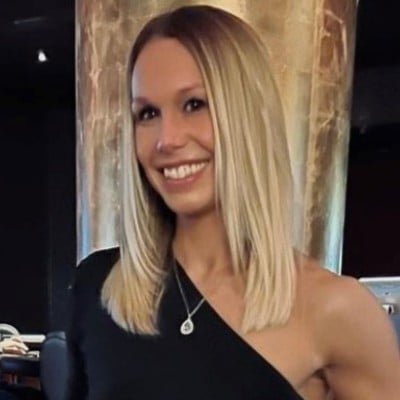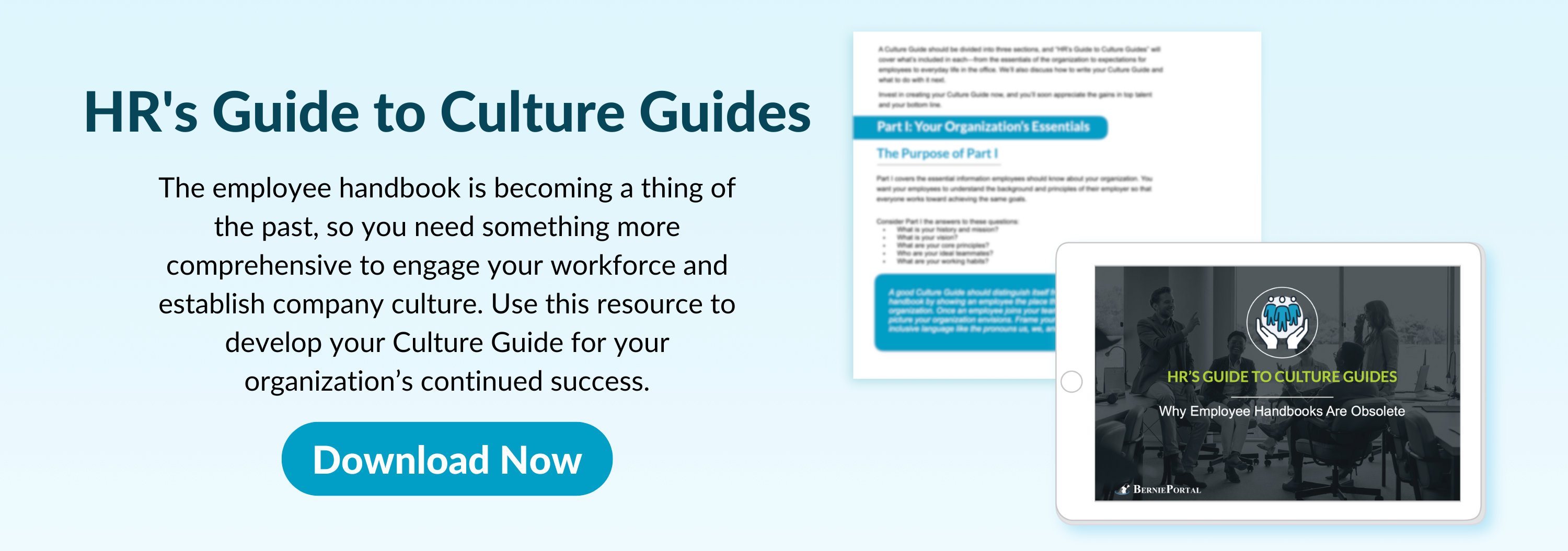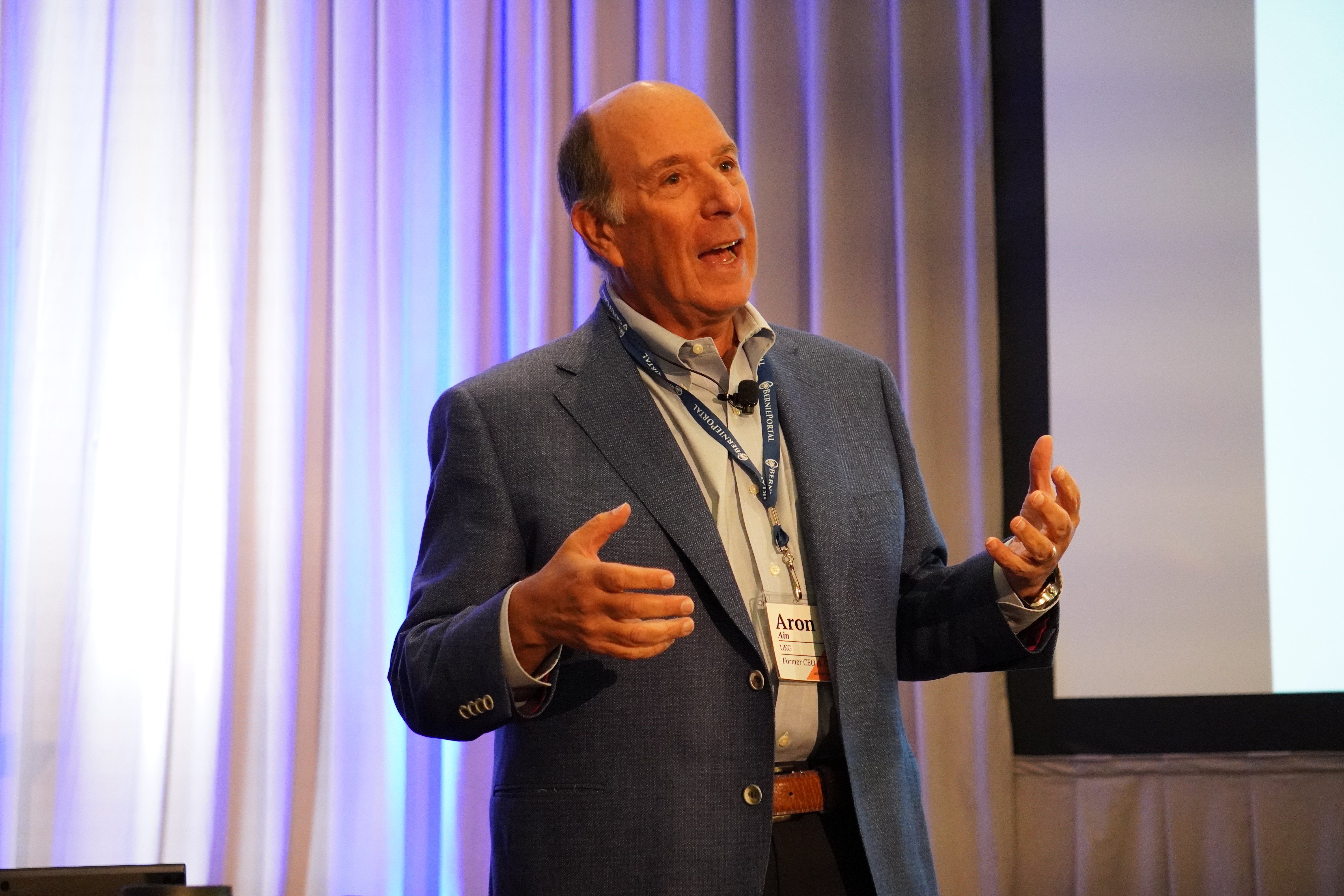
Written by
Katie Shpak
Katie is a content writer on the marketing team at BerniePortal. She writes about healthcare, human resources, and benefits.
8 Hindsights Every Leader Should Know

Has anyone ever told you—“Stop caring what other people think”?
Well, this may be helpful in some situations, but not always in the workplace. While HR professionals can’t worry about being perceived as everyone’s favorite, there are some qualities they should possess. And, they should care how others perceive them when it comes to those qualities.
For instance, HR should be trusted. They should be seen as reliable. Organized. Compliant. Fair. And the list continues.
Similar lists apply to managers and other leaders at the organization. What if managers showed up late to meetings, delegated the majority of their work, and often left early? Do you think direct reports would have much respect for them? Would that motivate them to show up on time get their work done, and stay for a full workday?
The answer is definitely, “no”.
Leading by example is essential. And in turn, as a leader, you should care what those you lead think of you as a professional.
Throughout this blog, I will share with you the eight Hindsights that Derek Young (DY), legendary keynote speaker and author, believes that every leader should know.
Hindsight 1: Develop a Clear Purpose
A leader must have a clear purpose, otherwise, where do the motivation and discipline originate? We become motivated and disciplined when there is a clear goal or purpose that we are trying to achieve. It’s the very thing that keeps every leader focused long-term.
To clarify, DY discussed the substantial difference between engagement and work ethic. An employee may be exceptional at their job. They may work extra hours, excel on projects, and appear to be ideal for the role. However, that same employee may get home from work, pour a glass of wine, and vent to their spouse for hours about how miserable their job is. That employee has an excellent work ethic, but are they engaged in their job? Definitely not.
That employee’s purpose is probably a paycheck. While a paycheck is an inarguably good incentive for every single individual with a job, it should not be the only motivator. Especially not for a leader.
DY went on to discuss the ultimate formula for developing your clear purpose. First, he expresses the difference between a gift versus a calling. This indication can be the difference between worth ethic and engagement. When someone has a gift, they have an innate talent. That talent, however, does not indicate a passion for doing a particular job. It can, but someone can easily be talented at something they despise doing. Whereas, a calling is something you feel an emotional pull towards. It brings joy.
When you pursue your calling, it will have a unique impact on you, and it may also have an impact on others. Think about your favorite singer or band. Their calling was to create music. Writing and singing have a significant impact on them, but how does it impact you when you put your headphones in and listen to their albums? Do certain lyrics or beats resonate with you?
When you follow your calling, you can impact others around you. By defining your purpose and combining it with the fulfillment of following your calling, you create your legacy. Your legacy is the impression your life may leave on others, further inspiring and impacting those around you. A leader’s ultimate goal is to inspire those they lead.
So, when you develop a clear purpose for your life and in your career and continue to see it through, you will make an exceptional leader.
Hindsight 2: Maintain a Strong Mentality
Have you ever heard someone say, “I can’t believe ‘so and so’ was that rude in that meeting!”? When, in reality, ‘so and so’ is often rude?
Spending so much time and energy on things that not only are out of our control, but that also should not come as a surprise wastes valuable mental space.
DY talked about the importance of increasing your daily anticipation through self-talk. Meaning, remind yourself daily of what you do know. What your strong suits are. What you have control over and what you don’t.
What are your goals? What do you want to spend your mental energy on that day?
Set your mind up for success.
Hindsight 3: Surround Yourself with the Right People
It’s often said that those with whom you spend most of your time have the greatest impact on who you become. If you surround yourself with unmotivated, apathetic individuals, you will likely become unmotivated and apathetic. If you surround yourself with go-getters, you will likely be inspired to be a go-getter.
DY said that every professional should have a Board of Advisors. This board will:
- Care
- Counsel
- Challenge
- Connect
- Correct
Each person on your board should care about you, serve as a counsel, challenge you to grow, have a connection with you, and correct you as needed. Each of these C’s are critical to your personal and professional growth.
Additionally, you need subject matter experts to:
- Inform
- Inspire
- In-step
There are always going to be people that can teach us. Growing means always learning, and always learning means surrounding yourself with subject matter experts, whether that be in person or through resources (books, podcasts, etc.).
DY also reminded us not to forget about our blind spots. I’m not just talking about driving here. I’m talking about in life. We can’t see everything. We can only see through our own lens, and sometimes, it’s important to see through others’. Therefore, we all need a blind-spot team.
This team will:
- (Right) Steer you in the right direction
- (Responsible) Make sure you’re making responsible decisions
- (Real) Be real with you
And lastly, he said to make sure you have a “blow steam team”. This is the team that you can share anything with and have it be completely confidential. We all need a safe source to go to where we can blow off steam without fear of it leaking out. This person is someone you trust to the very core.
Surround yourself with your board of advisors, subject matter experts, a blind spot team, and a blow team steam, and there’s no doubt you’ll be closer to achieving your purpose.
Hindsight 4: Make Self-Care a Priority
People often claim that they are giving 100% of themselves to someone or something else. But, how can someone give 100% of something, if they themselves aren’t 100%?
It is extremely common for self-care to fall to the back burner when it should be a top priority. The better you are and the better you feel, the better you’ll perform and the better you’ll be for others. Therefore, taking YOU time is not only a priority, but a necessity.
DY stated,
“Take a break before you need a break, and you’ll probably never need a break; and you probably won’t break.”
Hindsight 5: Keep Growing
We should all be invested in lifelong learning. Whether the growth is for career or personal development, always learning and being open to learning is key. DY advised incorporating frequent and consistent “seatbelt sessions.” Essentially, you sit down with your leader, and you ask, “What do I need to fix?” Then, you simply stay seated and listen until they’re done. As a result of those sessions, you will have action items to implement in order to grow.
He even recommends starting with the action item you hate the most, as they are likely to be the more challenging changes to carry out. I like to refer to these as, eating your frog! If you’re unfamiliar with the term, I highly recommend reading, “Eat That Frog,” by Brian Tracy.
Hindsight 6: Help Your Team Grow
As a leader, your priority should be to help your team grow, both individually and as a team. A very important component of helping your team grow is ensuring to communicate your standards. Further, make sure the team understands those standards. Have them communicate the standards back to you, showing a clear grasp of the goals required for their success. Then, coach them. Help them achieve those standards. Be a support for them.
Communication is truly the key to developing a strong team. However, people often misunderstand communication. DY shared that, “Communication is confirming receipt and confirming understanding.”
It’s more than just relaying information; the information must also be understood.
Hindsight 7: Hold Your Team Accountable
As a leader, do you care more about feelings or future?
Sure, we all want positive feedback, but it’s not positive feedback that helps us grow. What helps us grow is being held accountable to fix the areas where we fall short. The areas where our support team and our accountability partners express room for improvement.
In DY’s opinion, if someone is not giving you honest feedback, they do not care about you. Someone who cares about you should want you to grow and should be supportive and helpful in that process. If you submit something to your supervisor, and they say it’s good even when it’s not, how would you know to improve it next time?
Managers owe it to their direct reports to provide honest feedback, or else they aren’t developing them. For more information on how to provide effective feedback, watch our HR Party of One episode.
Hindsight 8: Maximize Meetings
When your company has meetings, are they normally discussions, or are people exiting the meeting with clear action steps?
Meetings should result in decisions, not become an avenue for future discussions.
To improve the structure of meetings at your organization, here are some steps:
-
Send out an early agenda. Ask meeting participants to add to the agenda as needed. That way, everyone goes into the meeting knowing exactly what is being discussed and can prepare accordingly.
-
When a meeting invite is sent, schedule the meeting 30 minutes longer than necessary. There are two reasons for doing so:
a. You can use the extra time to summarize the meeting and ensure everyone understands the decisions that were made in the meeting and what the action items are that need to be executed.
b. Your meeting should never take the full additional 30 minutes, so everyone will always be happy to get “extra time” back in their day from meetings ending early.
The person who ran the meeting should also make sure to send out the action plan after the meeting ends. The additional time allotted for the meeting may give the organizer some time to send it out then.
It’s also a great idea to rotate roles in the meeting, when feasible. It can help participants develop themselves as leaders and get comfortable running a meeting. It also switches up the cadence of meetings, and may offer different perspectives and styles of how to run them, which could help with team growth.
Many of our HR Party of One resources can also serve as guides to help you grow as an HR professional and as a leader in your organization.
Additional Resources
You can stay informed, educated, and up to date with important HR topics using BerniePortal’s comprehensive resources:
- BernieU—free online HR courses, approved for SHRM and HRCI recertification credit
- BerniePortal Blog—a one-stop shop for HR industry news
- HR Glossary—featuring the most common HR terms, acronyms, and compliance
- Resource Library—essential guides covering a comprehensive list of HR topics
- HR Party of One—our popular YouTube series and podcast, covering emerging HR trends and enduring HR topics

Written by
Katie Shpak
Katie is a content writer on the marketing team at BerniePortal. She writes about healthcare, human resources, and benefits.
Related Posts
We just wrapped up another phenomenal Weekdays with Bernie (WWB) Conference!
Employees are the heart and soul of an organization, and valuing their opinions can have...
Overhiring amongst large corporations has ceased, and now, the tables are turning on the...
Every year, the month of March is dedicated to honoring women’s tremendous contributions...








Submit a Comment